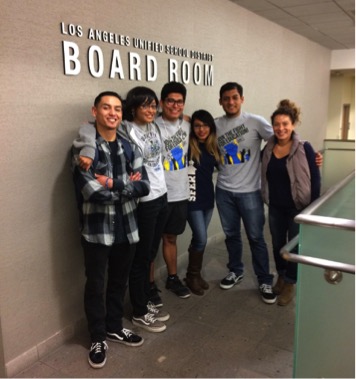LAUSD school board elections are over! Hundreds of community supporters, educational activist, and voters participated in an election that was widely followed by activists, educators, and families. I applaud everyone who participated in the election, but your job is not done! Political engagement doesn’t stop once elections are over. Attending school board meetings are an excellent way to stay involved in education politics after elections. In LAUSD, school board meetings are held on the 2nd Tuesday of every month during the academic year. Here are 3 reasons why a group of UCLA and Whittier College students spent their Tuesday evening attending a school board meeting.
1. ACCOUNTABILITY
Martin Capuchino, a 3rd year political science major at UCLA, recently attended a school board meeting because, “[he] realized the only way to make change in education is to STAY involved and informed.” Fighting for education reform involves working with politicians to empower and improve our communities, “…but in order to demand change we must hold these elected officials accountable.” Holding elected officials accountable is key to improving the quality of education in public schools. Accountability involves holding elected officials responsible for following through on the promises they made during their campaign.
2. BE INFORMED
Gabriel Perez, a third year political science major at Whittier College, believes that attending school board meetings is necessary because reforming a broken system of education, which perpetuates social stagnation requires a comprehensive knowledge of the education policy that precedes it. Perez said, “Board meetings empower community members through providing the opportunity to better understand said policy, observe and become familiar with the policy-making process, and evaluate the policy-makers themselves, but, more importantly, they provide community members a platform to voice their concerns and hold their elected officials’ feet to the fire.” While holding politicians accountable is crucial, holding ourselves accountable by being informed about the issues is also incredibly important in creating political change.
3. OUR VOICES MATTER
Public comment is a designated segment where community members can briefly discuss opinions on impending policies or request action from the board members. Last April I gave public comment regarding my experience on LAUSD’s lack of action in implementing ethnic studies “My first day at UCLA was the first time I felt like a minority.” My public education upbringing failed to equip me with the cultural empowerment required to navigate predominantly white institutions. As an LAUSD alumna, I encouraged board members to take action to prevent students of color from feeling academically inferior in college and to promote cultural empathy for all students. As community members, our voices our undeniable, we must do our part in vocalizing the needs of our students in order to work with elected officials to reform today’s education system. Afterall, how can we expect board members to accurately advocate for the need of the community without sharing our voices?
Political engagement does not end once election season is over. As advocates for education, it is our civic duty to continually work with elected officials to create a better education system for our students.
Desiree Martinez
Latest posts by Desiree Martinez (see all)
- Broken Student Loan System Gets An Overhaul - June 6, 2022
- Cellblock Scholars: The First College Behind Bars - May 25, 2022
- Sin Preparación en la Universidad; Puntajes bajos debido a la Pandemia - April 27, 2022
- Unprepared in College; Sinking Scores Due to Pandemic - April 21, 2022
- Los Estudiantes No Se Inscriben en la Escuela Para Hacer una Declaración Política, Ellos Van a Aprender - October 29, 2018

